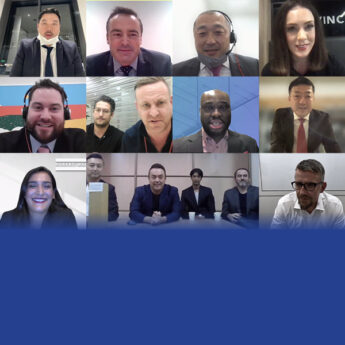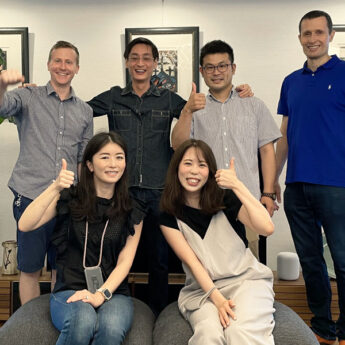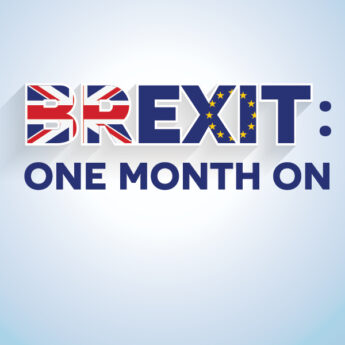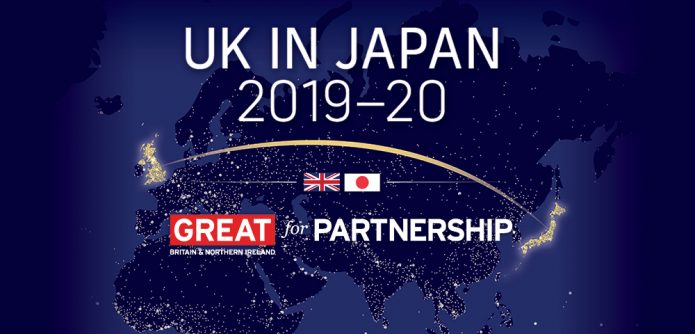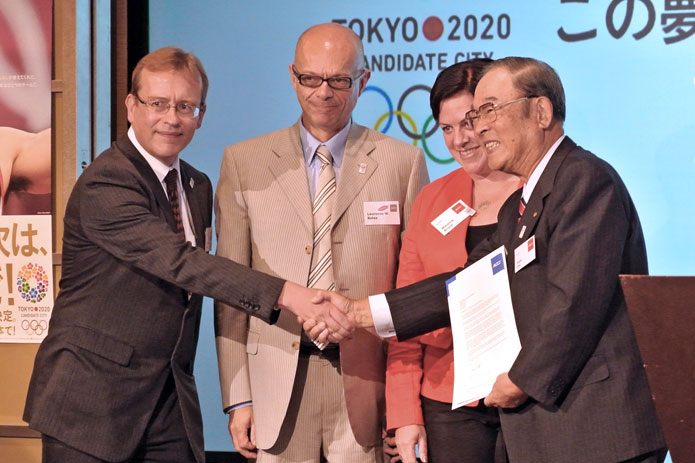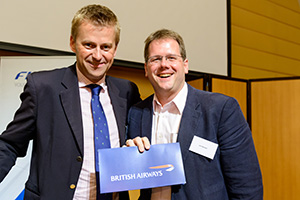
Jonty Brunner (left) of British Airways and Jim Weisser
A total of 54 people from 14 countries made up the teams for JMEC 21, an event which Phil Gibb OBE, chairman of the judging panel and former president of the British Chamber of Commerce in Japan, described as “arguably the best mini-MBA programme in the world today”.
“I never fail to be impressed by the range and depth of the projects and the effective, professional and marketable business plans that the teams devise”, said Gibb, who was serving as a judge for the last time before departing Tokyo for Barcelona.
It was those attributes that were shown by Team Galileo, the group charged with drawing up a Japan market plan for Germany’s PINK GmbH Thermosysteme, and winner of the first prize.
As well as a Waterford cut-glass award, each of the team members—Thomas Applekamp, Shingo Funahashi, Jenny Kwon, Jasmine Li and Andrew Scott—won round-trip flights to Europe with British Airways and a one-year membership of the American Chamber of Commerce in Japan.
Commending the team, Tom Whitson, JMEC Executive Committee chairman, said Team Galileo had “worked with dedication and creativity to deliver a tailored business plan”.
“The client has also expressed its appreciation for the energy and outside-the-box thinking that the team has demonstrated”, he added.
In second place were the five budding executives who devised a business strategy for medical devices firm Coloplast Japan, while in third spot was the team that advised another German firm, Herrmann Ultraschall.
The organisers of the event introduced a number of new awards this year, with teams recognised for the quality of their market research and their oral presentations to the judging panel, as well as for “sheer determination”.
JMEC was initiated by the Australian and New Zealand Chamber of Commerce in Japan in 1993 and is today supported by 18 chambers of commerce. It also has the backing of a number of corporate sponsors, including British Airways, Custom Media K.K., Hewlett Packard Japan Ltd., CarterJMRN and daijob.com.
The idea behind the competition is for teams to sharpen their skills as up-and-coming executives while assisting foreign firms by developing a high-quality business plan tailored to Japanese market needs. The process lasts a gruelling five months and, to date, it has seen well over 1,000 potential future captains of industry graduate from its ranks.
“Something like this is a tremendous boost to young people who are not long out of the education system and want to get truly hands-on experience in the world of business”, Jonty Brunner, regional general manager for Japan and Korea for British Airways, told BCCJ ACUMEN.
“These people bring a new and interesting perspective to the table, and that can be seen in the ideas they have come up with and the plans they have devised”, he said.
“British Airways has been supporting JMEC for five years now and we have found that the enthusiasm the team members have to participate serves to generate a lot of positivity”, he added. “It’s a lot of hard work, but both the team members and the companies get a huge amount out of it. It’s truly a win-win situation”.
JMEC 22 is scheduled to begin in September, with information seminars held in advance to enable potential participants to find out more about the scheme.
The schedule for the upcoming contest will again be broken down into four phases, with the first period of training and development, followed by lectures and then workshops, both of which will focus on entry into the Japanese market and business planning. The final three months will be used by the teams to prepare their business plans.
With guidance provided by a mentor and a business consultant, each of the teams will be required to develop an effective plan for a firm operating in the Japanese market. It will include business strategy, marketing, distribution, finance, organisation, human resources and legal issues.
Judging will take place after April 2016 on the basis of written and oral presentations before the winners are announced in June.

